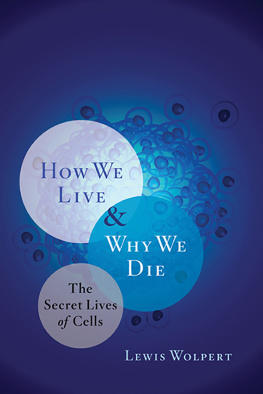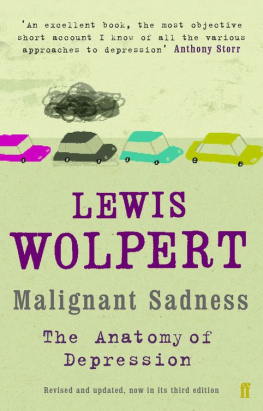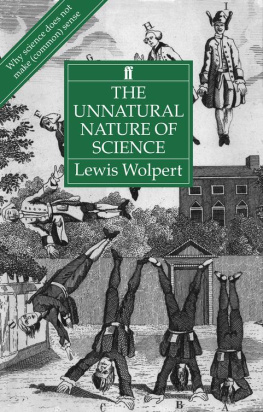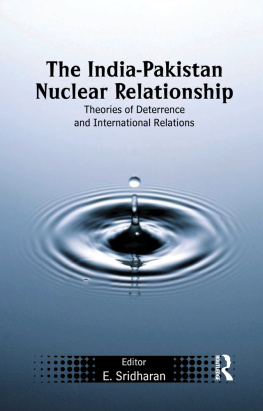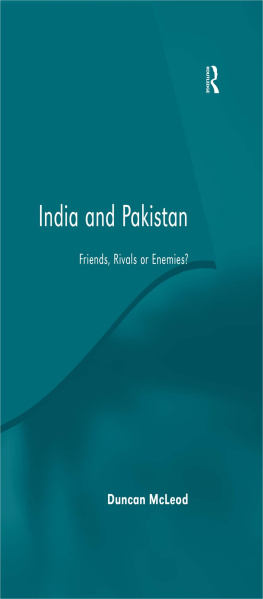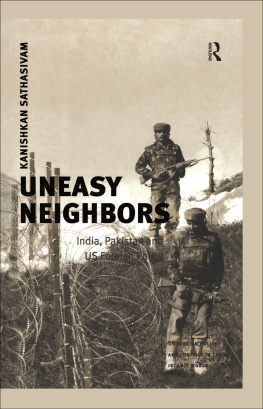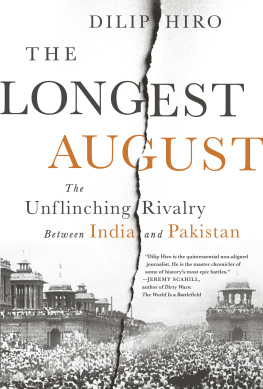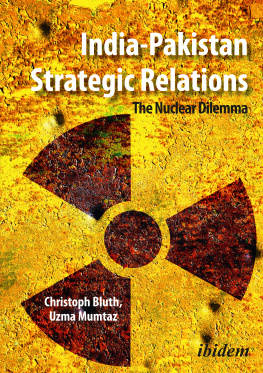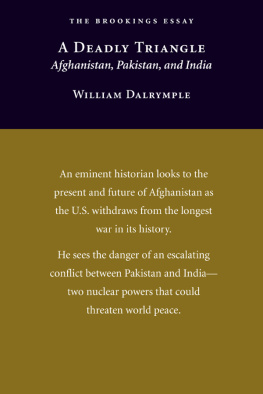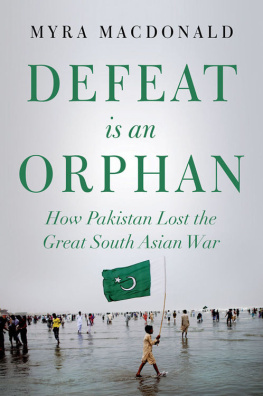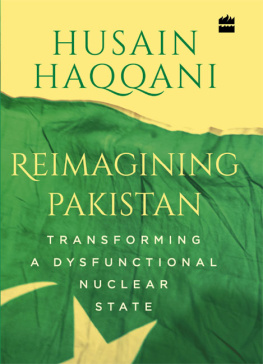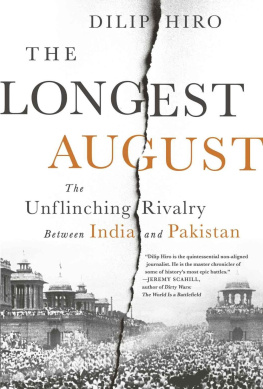India and Pakistan
ALSO BY THE AUTHOR
Tilak and Gokhale: Revolution and Reform in the Making of Modern India (UC Press)
Nine Hours to Rama
Morley and India, 19061910 (UC Press)
An Error of Judgment
Roots of Confrontation in South Asia: Afghanistan, Pakistan, India and the Superpowers
Jinnah of Pakistan: A Life
Massacre at Jallianwala Bagh
Zulfi Bhutto of Pakistan: His Life and Times
An Introduction to India
Nehru: A Tryst with Destiny
Gandhis Passion: The Life and Legacy of Mahatma Gandhi
Encyclopedia of India (editor)
Shameful Flight: The Last Years of the British Empire in India
A New History of India
India (UC Press)
India and Pakistan
Continued Conflict or Cooperation?
Stanley Wolpert

University of California Press, one of the most distinguished university presses in the United States, enriches lives around the world by advancing scholarship in the humanities, social sciences, and natural sciences. Its activities are supported by the UC Press Foundation and by philanthropic contributions from individuals and institutions. For more information, visit www.ucpress.edu .
University of California Press
Berkeley and Los Angeles, California
University of California Press, Ltd.
London, England
2010 by The Regents of the University of California
Library of Congress Cataloging-in-Publication Data
Wolpert, Stanley A.
India and Pakistan : continued conflict or cooperation? / Stanley Wolpert.1st ed.
p. cm.
Includes bibliographical references and index.
ISBN 978-0-520-26677-3 (cloth : alk. paper)
1. IndiaForeign relationsPakistan. 2. PakistanForeign relationsIndia. 3. IndiaMilitary relationsPakistan. 4. PakistanMilitary relationsIndia. I. Title.
DS450.P18W65 2010
Manufactured in the United States of America
19 18 17 16 15 14 13 12 11 10
10 9 8 7 6 5 4 3 2 1
The paper used in this publication meets the minimum requirements of ANSI/NISO Z39.48-1992 (R 1997)
(Permanence of Paper).
To the innocent Kashmiri victims of the deadly
cross-fire between India and Pakistan
over the past sixty-three years.
May peace prevail.
CONTENTS
MAPS
PREFACE AND
ACKNOWLEDGMENTS
No Asian conflict has proved more deadly, costly, or intractable than that which continues to divide India and Pakistan over Kashmir. For the past half-century, since I first became aware of this conflicts potential for regional destruction, I have pondered the alternatives for its resolution. Many wise friendsIndian, Pakistani, American, European, and Australianhave assisted me in understanding the complexity of the conflict.
When I chaired the History Department at UCLA, Rafique A. Khan, a leader of the Kashmiri community in Los Angeles, first urged me to organize an academic conference to explore how to help achieve peace in Kashmir. Prior commitments and obstacles, however, prevented me from launching so ambitious a project until April 2002, when the Ronald W. Burkle Center for International Relations at UCLA agreed to be its sponsor.
That centers director, Professor Michael Intriligator, cochaired our conference, Ways to Help Resolve One of the Worlds Most Dangerous Conflicts. We invited scholars and other speakers from India, Pakistan, Washington, D.C., and London to participate in the Sunday conference, which we hoped to conclude by approving a set of appropriate resolutions to be sent to the United Nations and to Washington, New Delhi, and London.
Our conference brought together some four hundred Kashmiri Muslims, Hindu Pandits, and other Indo-Pakistani scholars and community leaders, filling our faculty centers largest room and terrace, the first so diverse a group assembled to focus on the Kashmir conflict on any campus in America. Many probing questions were asked during our morning sessions, stimulating fruitful discussions of alternative paths to peace. But when Londons Lord Ahmed, the only Kashmiri Muslim in Britains House of Lords, started to speak on behalf of the Kashmiri community about the conduct of Indian troops in Kashmir, who had raped many Muslim women there, he ignited so volatile a response from Hindu Indians in the room that most of them jumped to their feet, shouting, Lies! Retract! Throw him out! Several of my own colleagues screamed, Boycott this meeting! and advanced with fists clenched toward the speaker. Our campus police, fearing a riot, asked me to permit them to clear the room. My repeated appeals for nonviolent civility and freedom of speech, however, managed to convince most of our audience to return to their seats a few minutes later; only a handful of angry Pandits stomped out, urging all Indians to boycott the conference.
Somehow we managed to complete our conference without further violent shouting or dire threats, and a few useful suggestions did emerge by the end of that day on potential ways to resolve the bitter Indo-Pakistani conflict over Kashmir. I had hoped that we would draft a road map to peace that Sunday, but I felt grateful, when it had ended, that we had avoided bloodshed. I vividly realized that if a few strong words spoken on our beautiful campus half a world away could trigger so much explosive anger and hatred, what terrifying damage daily gunfire and suicide bombings were doing in the once-happy Valley of Kashmir itself. I did not abandon all hope of helping to resolve that dreadful conflict, but I knew it would take far longer than I had once navely anticipated.
So many friends have helped me over the past four decades that I regret being unable to acknowledge my indebtedness to them all. I must first mention my Sanskrit guru, Professor W. Norman Brown, founding chair of the Department of South Asian Studies at the University of Pennsylvania, who awakened my interest in the tragic plight of Kashmir. Professors Holden Furber and Norman Palmer of Penn also shared with me their insights gained from many visits to Kashmir, as did Professor Richard Park of Berkeley and Vice-Chancellor J. Richard Sisson of UCLA. Many diplomat friends have added to my appreciation of how arduous their struggles have been in the pursuit of Indo-Pakistani peace, and I thank each of them for sharing their wisdom with me: Ambassador Robert B. Oakley, Ambassador Frank Wisner, Ambassador Jamsheed Marker, High Commissioner Kuldip Nayar, Ambassador Riaz Khokhar, Ambassador Teresita Schaffer, High Commissioner S.I. Abbas, Ambassador Abid Hussain, and Ambassador Rick Inderfurth.
I thank former Prime Minister Inder Kumar Gujral for his wise and abiding friendship over half a century and former Foreign Minister Raja Dinesh Singh, who also treated me as a member of his own family whenever I visited him in India, as his dear nephew, my former student Madhukar Shah, still does. Another of my dearest old Indian friends, Chhote Bharany, father of my former student Mahesh, has introduced me to more leading Indo-Pakistani negotiators for peace at his house parties than I have ever met in either Islamabad or New Delhi.
I am grateful to Pakistans Foreign Minister Makhdoom S.M. Qureshi for his kind and warm encouragement at our recent meeting at Consul-General Abbass house in Los Angeles. I must also thank my oldest Pakistani friends, Khalid Shamsul Hassan and Ardeshir Cowasjee, for teaching me so much about their troubled state. I thank Sardar Mumtaz Ali Bhutto and his son Ali for sharing his recent articles with me, and his daughter, Tasi, and her husband, Rizvan Kehar. Former Prime Minister and Minister of Finance Shaukat Aziz most kindly helped me during my past few visits to Pakistan.
Next page

